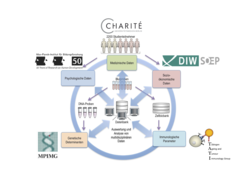Subprojects
BASE-II is a collaborative project. The Berlin Aging Study II is characterized by an interdisciplinary approach. Many research questions are addressed and answered jointly. Here you find more information about the investigative approach and results of the various research units which provide the basis for the mulitdisciplinary approach.

Subproject Medicine/Geriatrics
The medical assessment includes information about the cardiovascular system, the musculoskeletal system, and about nutrition and sexuality. Blood samples are taken to obtain various laboratory parameters and to acquire genetic information. An electrocardiogram (ECG) and measurement of lung capacity, bone density, hearing, vision, and motor skills complete the examination protocol.
Immunology
In the immunological assessment, which is part of the subproject medicine, blood cells are surveyed to generate data on frequencies of the different immune cell types and their differentiation status. Serum biomarkers relevant for inflammation complete the immunological characterization. The immune parameters of the BASE-II participants are analyzed in relation to different medical, psychological, and socio-economic phenotypes.
Subproject Psychology
For the psychological examinations, extensive cognitive and psychosocial tests are carried out. The battery includes various facets of episodic memory as well as measures of working memory, cognitive control, fluid intelligence, reading skills, and decision making. It also includes a newly developed measure of subjective health, the subjective health horizon, to assess participants’ motivation to engage in explorative and novel activities. Younger and older adults are tested in separate group sessions. The psychosocial questionnaire contains measures of self-reported health, well-being, personality, stress, coping, and of attitudes towards aging.
Subproject Survey Methods & Social Science
Subproject Molecular Genetics
In this subproject, the molecular genetic data of the participants are collected, on the basis of which, for example, analyses will be performed in genome-wide association studies (GWAS) or epigenome-wide association studies (EWAS). This includes the genome-wide genotyping of so-called single nucleotide polymorphisms (SNPs) for the GWAS and the collection of genome-wide DNA methylation profiles for the EWAS as well as the respective statistical analyses.
